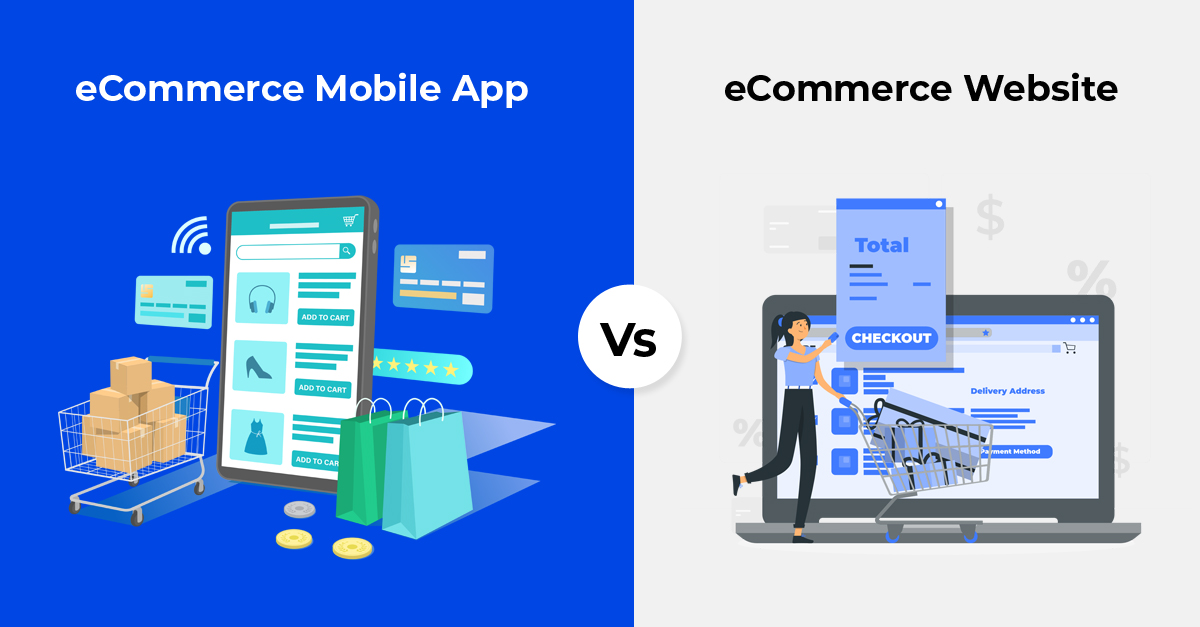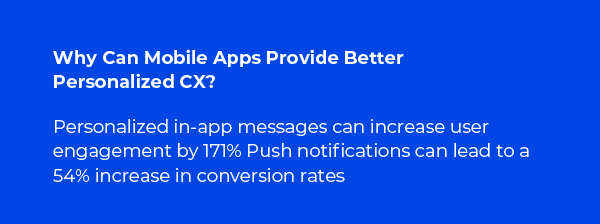Ecommerce Website vs Mobile App: What is Right for Your Online Business?
-
 Kamlesh
Kamlesh
- 2 years

In today’s digital era, businesses can sell their products and services through various channels, including eCommerce websites and mobile apps. While both channels offer numerous benefits, choosing the right platform for your online business can be a challenging task.
In this blog, we will discuss the pros and cons of eCommerce websites and mobile apps and help you determine which option is best suited for your online business. We will cover various aspects, including eCommerce Customer Experience, Development Cost, and Marketing Strategies, to help you make an informed decision. So, let’s dive into the world of eCommerce websites and mobile apps and explore which platform is the right fit for your online business.
Mobile Apps vs Websites: Which is Better in 2023?
As an eCommerce business owner, you want maximum exposure for your business. Thus, if you’re going to target both mobile and web audiences, you need both.
In fact, many popular eCommerce giants such as Amazon, eBay, and Flipkart are prioritizing both channels – mobile apps and websites. However, not every business has the resources to invest in both platforms due to cost, timeline, and workforce limitations. This can result in companies compromising and settling for a middle-ground solution.
With that said, let’s analyze both options as per different parameters to find out investing in which one would be more profitable for you.
1. Personalized Experiences
Ecommerce websites allow businesses to personalize the shopping experience for their customers by utilizing data such as purchase history, browsing behavior, and preferences. For example, businesses can use this data to recommend products that a customer may be interested in based on their previous purchases or products they have viewed. eCommerce websites also allow businesses to offer personalized promotions, discounts, and product recommendations based on the customer’s shopping behavior.
On the other hand, mobile apps offer even more personalized experiences as they have access to a broader range of customer data, such as location, device type, and usage patterns. Mobile apps can use this data to offer location-based promotions, personalized notifications, and customized product recommendations based on the customer’s browsing and purchase history.
Additionally, mobile apps can use features such as in-app messaging and push notifications to communicate with customers directly, offering them a more personalized and engaging experience. In a nutshell, both eCommerce websites and mobile apps provide personalized experiences to customers. Still, mobile apps have the added advantage of offering more personalized features due to their ability to access a wider range of customer data.

Winner: eCommerce Mobile Apps
2. Development Cost and Time
Developing a digital solution is not cheap. It requires hours of planning, research, coding, testing, and maintenance. So, before you settle on a decision between an eCommerce website and a mobile app, it is mandatory to take development costs and time into consideration.
If you plan to develop an eCommerce website, you would require the following:
- A web development team with expertise in HTML, CSS, and JavaScript
- A team for regular maintenance & updates, which can add to the overall cost over time
- The development process can take some time, and the cost depends on the complexity
If you plan to develop an eCommerce mobile app, you would require the following:
- A specialized team with expertise in mobile development frameworks such as React Native or Flutter
- Ongoing maintenance and updates, adding to the cost over time
- The development process can be more complex than building a website, as apps must be designed for multiple devices, operating systems, and screen sizes.
- This can lead to a longer development timeline and a higher overall cost than eCommerce website development.
Winner: eCommerce Websites
3. Visibility and SEO
eCommerce is becoming a highly competitive market with every passing day. Therefore, you must choose a solution that helps you get maximum exposure and traffic. Let’s see how mobile apps and eCommerce websites can help you get the same:
E-commerce websites are typically optimized for search engines through keywords, metadata, and structured data. This helps to improve their visibility and drive traffic to the website through search engine results pages (SERPs). Additionally, eCommerce websites can be promoted through digital marketing channels such as social media, email marketing, and pay-per-click (PPC) advertising, which can increase their exposure.
Mobile apps, on the other hand, are typically downloaded from app stores such as the Apple App Store or Google Play Store. It means that mobile apps have access to a large pool of potential customers browsing these app stores for new apps to download. However, the visibility of mobile apps can be affected by factors such as app store algorithms, app ratings, and user reviews.
All in all, eCommerce websites have an advantage over mobile apps regarding visibility and SEO. But, the number of users shopping on the go is also increasing every day. So, it is a tough decision as both have equal potential.
Winner: Both
Ecommerce Website vs Mobile Apps: The Verdict
When deciding between an eCommerce website and a mobile app for your online business, here are some factors to consider:
Choose an eCommerce website if:
- You want to prioritize visibility and SEO.
- You want to target customers who prefer shopping on desktop or laptop computers.
- You have limited resources for development and maintenance.
- Your business does not require features unique to mobile apps, such as push notifications or location-based services.
Choose a mobile app if:
- You want to target customers who prefer shopping on mobile devices
- You want to take advantage of mobile-specific features such as push notifications and location-based services
- You have the resources to invest in mobile app development and ongoing maintenance
- Your business can benefit from the increased exposure and potential for discovery through app stores
Ultimately, deciding between an eCommerce website and a mobile app will depend on your business needs, target audience, and available resources. It is also possible to develop both a website and a mobile app, depending on your business goals and budget. Or, you can choose to create a PWA.
Why Invest in a PWA – The Best of Both Worlds
A Progressive Web App (PWA) is considered the best of both worlds as it combines the advantages of a website and a mobile app. PWAs offer a mobile app-like experience with fast loading times, push notifications, and the ability to work offline while also being easily accessible through a web browser.
Additionally, PWAs can be optimized for search engines, offering improved visibility and SEO benefits similar to an eCommerce website. Developing a PWA can also be less costly and time-consuming than building a native mobile app. Overall, a PWA can provide a seamless user experience across desktop and mobile devices while offering the benefits of both a website and a mobile app.
Wrapping Up
This blog discussed the pros and cons of eCommerce websites and mobile apps for online businesses. It examined factors such as user experience, cost, development, and marketing strategies to help readers determine which platform best suits their business.
It concluded that while both channels offer advantages, businesses should consider their specific requirements before deciding which option to invest in. They should consider factors like visibility and SEO, targeting customers based on their device preferences, and having sufficient resources for development and maintenance.
To make an informed decision about your business needs, contact Envision eCommerce experts.












